|
A reporter once asked the celebrated orchestra conductor Leonard Bernstein what was the most difficult instrument to play. "Second fiddle! I can always get plenty of first violinists, but to find one who plays second violin with as much enthusiasm, or second French horn, or second flute, now that's a problem. And yet if no one plays second, we have no harmony.” It's supposed to be the pinnacle of ensemble playing, being on the 'first' part. It means you're the best, you can play all the hard stuff, you can do the twiddly bits. It's just one step down from being a soloist. It's fascinating watching the jostling for position - both physically and metaphorically - that can happen in some groups. So-and-so should play first because they've been here the longest. Whatshername should do it because she's 'better'. Ask a big group of musicians to allocate themselves to parts and some will rush to either end - they want to play first because they're 'good enough', or they want to play fourth or fifth because they're 'not good enough'. They want to show off or they want to hide. They'll insist on playing the top part or they'll step back and offer it to someone who they think is better than them - there can be a game of "no, no, after you"... "no, no, I insist". This ranking of musicianship is ingrained in us from the early stages of playing - 'first' is something to aim for, it's where the better players end up. And it's true that first parts tend to be more technically challenging and mostly, in a higher register, which is something that flute players, at least, learn as we get more advanced. But that doesn't mean that playing second (or other parts in different ensembles, such as a flute choir) is easy or any less valuable. You might not get the high twiddly bits, but you might have a vital harmony part. Can you blast out those lower notes so they blend with the higher ones elsewhere rather than being drowned out by them? Can you maintain a repeated pattern on the same couple of notes for ages without it losing energy? Can you handle playing on the off-beats for ages? Can you concentrate to count for lots of bars rest?! Can you match your sound to that of the person playing first? Someone once described the role of orchestral flutes to me as the first providing the 'colour' and the second having to adapt into that first players sound - that's quite a skill. Sometimes the second or third part will be doing something completely different to the first, and having to blend with the violins or the French horns. As individual instrumentalists, our education doesn't always prepare us for this - flute players, for example, mostly learn solo repertoire. We're used to playing the tune (I've had transfer students who could only play the top line of duets because they'd never played the second part - they found it such a challenge visually to follow the lower line!). So when we join an ensemble, we might opt for what seems like the 'easier' part, but then discover that it isn't that at all. We're not accustomed to playing harmony parts, to making so much use of our low notes, to playing parts with so many gaps in them. Equally, ensemble directors might order the parts with the most experienced players on first and least experienced on 'lower' parts, and find the balance really not working. I wish we could get away from this idea of first as better. One of my very accomplished flute colleagues likes to sit in different places at our ensemble rehearsals, and noted that some less advanced players asked why she was "lowering herself" to play third or fourth flute. But it's enjoyable, good for your playing, and great for exercising different skills to mix it up. In the orchestra I play with, we have three regular flautists, and we rotate around parts, depending on who would prefer to play what and playing to our strengths. For our next season, we're playing first for one concert each, and second for one half of each of the other concerts (with the occasional piece that needs all three). We figured it out through an online chat whilst one of our number was sunning herself on holiday, and I was on my sofa. We put forward our requests to play certain parts because of musical preferences, because we wanted to be in or out of our comfort zone, and so we could have a quieter time when other parts of our lives were hectic. It works - nobody feels left out or under pressure. It keeps us on our toes and makes us better players because we all get a turn at the twiddly bits, the harmony bits, the counting, the matching our sound to other people's. So, I guess this is an appeal to players, not to get hung up on the numbers. The composer wrote two parts or seven parts because they wanted them all, so they're all important. Try them all. Feel how glorious it is to play a bassline, to harmonise under the melody. Twiddle away on top or embrace those syncopated rhythms in the middle. And to teachers, too - get your students playing duets with you, and group pieces with each other, right from the start. Help them to be a flexible player who can happily get stuck in with any part of an ensemble and do a great job of it. A few links:
This article by flautist Rachel Taylor Geier has a great summary of the skills needed to play second flute. An excellent blog post by David Barton Music about the role of duets in lessons. "Who's on first?" - nothing to do with music but I was introduced to this comedy sketch last year, it inspired the title of this post, and the play on words makes me laugh so much!
0 Comments
Why do people play musical instruments? Why do they have music lessons? There are all sorts of reasons. To quote one of my younger students "I just like the sound!" - that's usually a big factor. Quite often, especially with adult students, there's a desire to to learn so they can play in a group. Even if the initial decision to learn is because you 'like the sound', people often develop ambitions to be able to join an ensemble or to play together with friends.
It sounds like a good plan, to get to the stage where you can play with other people, but I think there's a lot to unpick here. For me, playing with other people is a huge part of what playing music is 'about' - the communication, the connection, the teamwork, the blending of sounds - and I can probably be a bit evangelical about it. But it isn't a compulsory aspect of learning an instrument, and it is absolutely fine if what you want to do is play on your own, in your own house, because you like the experience of making a nice sound, but feel no particular desire to do that anywhere else or with anyone else. Music in this way can be very therapeutic - sometimes it's an escape from the stresses of life. Sometimes I shut myself in my spare room and just play whatever I feel like, and it makes me feel better. I'm also somewhat bothered by the idea that you have to reach a certain level of competency to play with other people - you have to be 'good enough'. Of course, if an established ensemble has a minimum standard, then obviously you have to meet that to join. In some cases, this can be a good motivator to practice and improve your playing. Sometimes you need the 'piece of paper' to show you're the appropriate standard, and I've had students set themselves goals of passing a particular exam so that they can join the next level up of school orchestra, or their nearest amateur wind band. However, I strongly believe that as long as you can make some sounds, you're 'good enough' to play with others in some way, if that's what you want to do. When I run student workshops, everyone is invited, no matter how long they've been playing for - and when we play as a group there are parts for everyone, even if I have to write a new part that just consists of Bs, As and Gs for someone who's only been playing a few weeks. Part of the problem with waiting until you're 'good enough' to play with others is that when you do reach that stage, you don't have any experience of playing with others! In one worst case scenario, you could be Grade 8 'on paper' but only ever have worked on exam pieces and not much else, and the only ensemble playing you've done is once a year with an accompanist, whose job it is to follow your playing, whatever you do. You could be technically brilliant, but just not used to playing a part that isn't 'the tune' and listening out for how your part fits in with everyone else. You might not have a lot of experience of sight-reading. You might not have any idea how to follow a conductor. Now, none of this is the fault of the student, but it strikes me that if one of your aims is to play in an ensemble, then one of the things you really need to learn is ensemble skills. That includes experience of listening to other parts and fitting in with them. It involves getting used to playing harmony parts and thinking about how they work in the piece as a whole, being sensitive to how loud or quiet you need to play, considering how to match your articulation or phrasing to what other people are doing. You need to get used to 'keeping going' whatever happens - there's a mantra about sight-reading for exams where people are told to keep going, don't go back and correct a mistake, and this is absolutely vital if you want to keep your place in ensemble music. You need to practice keeping in time with a whole load of other people - either by following a conductor or communicating somehow as a group. And really, the only way to learn these things is to do them. Teachers can help - I do 'playing together' and 'call and response' activities in lessons from the very start, and encourage students to learn duets for us to play together, rather than just using them as a 'fun' thing to do at the end of a lesson (this blog post from David Barton Music is also well worth reading on this topic). It occurred to me a while back that tutor books often have the student playing the top line of duets, for quite a long time, and then it can be quite tricky when you ask them to try playing the bottom line - your eyes just get used to looking in the same place - so have made a point of finding duets where both parts are manageable in the early stages. I think recorded backing tracks can play a useful role here as well, for the experience of playing along with 'someone else' who isn't going to adapt to you. Individual lessons can only do so much towards this though, and just playing with other people helps to make you better at playing with other people. It's one of the reasons I run Sheffield Flute Choir and also why we have an annual summer playday where anyone can come and join in (as well as improving people's skills, the other main reason is that it's fun getting together with loads of other flute players!). Obviously, getting guidance from more experienced ensemble members and leaders can be invaluable too, and *subtle move into advertising here* that's why I've asked Carla Rees to join us for the playday this August. I've experienced Carla's ensemble-leading quite a few times now, including with the rarescale Flute Academy and I'm every time I come away feeling like I've learned something new about how to play as a group. She has some serious words of wisdom about shifting your mindset from playing like a soloist to working as a team. If you'd like to hear them, and explore a range of excellent flute ensemble repertoire at the same time, come and join us in Sheffield on August 25th for our Summer Flute Ensemble Day. One of the best analogies I've ever read for how music lessons should be is in 'The Perfect Wrong Note' by William Westney - which compares the process to the student working on trying to get a machine working. They've tried all sorts and had some success, but when it comes to their lesson, they bundle up all the loose bits and bring them along to show their teacher - "I've managed to get this part fitted in here and working, but I can't figure out how these go together or how to make them turn round". Lessons are the place to get help with the things that you can't do or aren't sure about. I'm also always happy for students to text or email me between lessons if they have any questions - it might be something that's easily fixed with a quick answer or I can give you some ideas to try out in your practice. You can text me a picture of something in your music, asking "what's this again?!" or if you're really struggling to find a recording, I might have something I can bring along to your next lesson, or I might be able to record a quick mp3 of a few bars to help you out.
But music teachers can't be available 24/7 and there are other things you can do between lessons to help you figure out the bits you're not sure about. I still have occasional lessons, but part of learning music is also 'learning how to learn' and finding out where to go if you're puzzling over a problem. When you're used to looking these things up on a regular basis, it becomes habit, but if you're not and you're in the middle of a practice session thinking "help! I have no idea what to do!" then it can be difficult to know where to start. So I thought it would be useful to put together a page of resources in one place, to help students if they're stuck with something between lessons. There's a bit of a flute focus, but most of it will be handy for players of any instrument. (Side note: a lot of these are online resources, and a few people have mentioned to me that they get distracted if they have their phone/ computer nearby whilst practising. If that's the case, then maybe 'allow' yourself to have your phone/ computer/ technology item of choice only for the first or last, say, ten minutes of your practice session, when you're dealing with the specific issue that you need to look up. You might want to stop notifications from popping up for that time, if they're likely to lead you astray. Then you can either put it away for the rest of your practice session, or if you use it at the end you can finish, pack up your instrument and go and check all your social media if that's what you want to do!). How does this piece go again? As much as the sheet music tells us 'how a piece goes', there are times where we all get stuck with how something is supposed to sound. Some books come with CDs or downloads of the tracks which can help with this, but if they don't then YouTube is usually my first stop. As with any online resource, you need to exercise some care - professional performances are more likely to be accurate, but that's not to say there aren't lots of brilliant home recordings out there too. But do be aware that what you hear might not be exactly what's on the page, whether that's through error or intentional interpretations of the piece. Other online music resources like Apple Music and Spotify are great too, and it can be helpful to listen to different versions of the same piece to get ideas about how to play it. If you can't find the exact piece, then even looking up something in the same style can give you ideas about how to play it, for example looking up Minuets or Waltzes to give you a feel for those sort of pieces. How do I do that? YouTube also has some great instructional videos. If you're struggling with how to do something in particular on your instrument, it's worth a search to see if anyone's put up a video about it. Now, you will possibly find varying and even completely conflicting views on aspects of technique, but I always encourage students to experiment - so try a few out and see what gives you the results you're looking for, remembering that there is no such thing as "one size fits all" when it comes to playing an instrument. You'll also find lots of web sites written by flute players and teachers, with advice about technique and about particular pieces. Jennifer Cluff's site has a wealth of ideas and answers to questions sent in by players. Paul Edmund-Davies' Simply Flute has some great exercises accompanied by videos showing how to work on them. If you're exploring how to play alto or bass flute, have a look at these blog posts by Carla Rees on different aspects of the low flutes. If you're looking at some of the different techniques on the flute besides 'normal' notes, I think the short video tutorials at Flute Colors are brilliant - whether you've come across one of these 'extended techniques' in a piece, or you just want to try out making a different sound! You can also try asking on online forums or Facebook groups - there are plenty out there for general music and for specific instruments, which also have the benefit of acting as a community where you can chat to and compare notes with other people learning. Again, you'll probably get differing views on the same issue, so it pays to be open-minded to trying different possible solutions. I love arriving at a lesson to a student telling me they've been reading different ideas about how to do something - we can then play around with these in their lesson and see what works! How do I play that note? If you're stuck on how to play a particular note, fingering charts are what you need. You can often find these in the back/ middle of tutor books, or more detailed books (including alternative fingerings and trills) are available. You can also buy fingering charts that are small enough to carry around in your bag or flute case. If you prefer to go online, I like the charts at WFG and FingerCharts (which also has a really handy app for Apple and Android). What does that word mean? What is that squiggly sign on the music? If you're not sure or can't remember what an instruction on your sheet music means, whether it's a foreign musical term or a sign for an ornament, there are a few places you can look these up. If it's a word, just Googling can work (although it's often worth adding 'music' to your search term as the usage in music might be slightly different to the everyday translation). Likewise if you look up 'musical ornaments' you'll find lots of pages explaining what the symbols mean, such as the BBC GCSE Music resources. For generally improving your music theory knowledge, MyMusicTheory is a brilliant site with clear explanations and exercises to work through. If you prefer to have a reference book to hand, the classic is the ABRSM 'Pink Book' (and it's second volume, the blue one). Still stuck? Ask! Ask your teacher, ask a friend who plays an instrument, ask the other people in your band or orchestra. Lessons are just part of the picture of learning music, and you can learn as much from other people (which is one of the reasons why playing in a group is so good for your progress, as well as being enjoyable and social!). People learn in different ways, with different methods and pick up skills in different orders, so they might know something you haven't learnt yet, or have tried a different technique for whatever it is you're trying to do. And the same applies to you too - you might be able to answer someone else's question or suggest a solution to something that's been puzzling them. Or maybe you'll be able to work it out between you! Do you have any resources that you turn to when you're stuck? More suggestions are always welcome! I've been a member of the Incorporated Society of Musicians (ISM) since I started teaching. Essentially there's a choice of two 'unions' for musicians, the ISM and the Musicians' Union, both offering support, advice, legal protection, training, online communities and real-life meet-ups. I've benefited from the ISM's resources for teachers - I use a version of their teaching contract - and I couldn't (legally) do my job without their Public Liability Insurance (although I've thankfully never had to claim on it!). They run regular webinars which have given me some interesting food for thought on topics such as 'teaching in the digital age' (how do we keep the attention of children who are used to social media and computer games?), career planning and psychological wellbeing for musicians.
Their blog is a great resource of ideas and opinions from different musicians, too, and I've particularly enjoyed the new Teacher Focus series, where a private teacher writes about their own job, thoughts and experiences. So I was very happy to answer a call for more contributions to this series, and reflect on my background, principles of teaching and hopes for the future - you can read my post at https://www.ism.org/blog/private-teacher-focus-rachel-shirley. This photo has been doing the rounds on the flutey internet recently (I don't know where it originates from, so apologies for the lack of credit). These are some of the best flautists of the last couple of hundred years, and in particular these are their embouchures - the shape they make/ made with their mouths when playing. If you'd like to look at lots of other embouchures, there's a web page full of them over here: http://www.larrykrantz.com/embpic.htm. The point is that there are all sorts of differences between them - how much lip is above/ below the flute, what angle the lips/ flute are at, all sorts... and of course their lips are naturally very different in the first place. I saw one of the above flute players at the weekend - at the British Flute Society 'Flutastique' Festival, which was celebrating the links between British and French flute playing, and William Bennett's 80th birthday. Looking around the event was a perfect demonstration of the idea that one size doesn't fit all! Watching the performers' recitals - all wonderful players with fantastic, but different, tones - you could see different embouchures, different ways of holding the flute and using the fingers, different ways and degrees of movement when they played. And then there were the hundreds of attendees - on the Friday morning we had a great warm-up session with Katherine Bryan, and although we were all aiming at the same thing, 'good' relaxed posture and playing a nice clear 'B', a glance across the room showed numerous permutations and combinations of posture, hand positioning and embouchure. The same variations were in evidence at the manufacturers' stalls where people were trying out different flutes and finding that some worked for them and some didn't. When you watch someone playing the instrument you play, it's natural to analyse what they're doing (especially if you admire their sound or technique). If they sound that good, they must be doing it right! But seeing so many players in close proximity made it really obvious that there is no one 'right'. Trying out things that other people do is a great idea, but we have to work out if they work for us or not. We probably have to borrow bits and pieces from different people, rather than copying any one person's complete technique (unless they're your identical twin, in which case, it might work). It was fascinating to watch players on stage with some of their own students, and see the things that were similar but also those that were different. Through all this, it's worth considering that even if someone is really, really good, they might still be doing things that aren't ideal, even for themselves! They might have habits that they'd like to break out of but haven't quite managed to yet. They might have to work round issues such as fingers that don't quite do what they'd ideally do. I find hands fascinating - they vary so much, and trying to get a good playing position on the flute is a case of careful work between the student and teacher to find something that works for them (and then may need to be adjusted as they grow - a few of mine seem to have had finger growth spurts recently!). And what about attending a flute festival? That's not something that's going to suit everyone - it's pretty intense listening to, talking about, trying out, playing, thinking about flutes for a few days. If you're the sort of person who likes throwing themselves whole-heartedly into a subject for a weekend, then definitely worth it (it's not cheap, so whilst it's not a bad idea to miss the odd session to clear your head, you want to make the most of it). Not something I'd want to do every weekend, but every couple of years - definitely! The little badges below were my souvenir of the weekend - what a lovely varied bunch they are too! I was doing some updates to my website this morning, and I came across this wonderful, slightly chaotic photo from one of my student workshops/ concerts. This is a collection of my students and flute choir members, getting ready to perform to their family and friends. What I love about this photo - other than the fact it contains lots of people who I really like - is the communication between people, the concentration, the variety of people. I love that you can see players helping each other out with getting their music ready to play, supporting each other. And all the friends and relatives ready to hear the outcome of the lessons they might pay for (or keep out of the way in another room for), the practice they overhear/ endure (I know listening to someone embarking on a new octave can be less than tuneful), the enthusiastic ramblings about flute playing that they kindly listen to.
I've also been using the quieter time over the summer to sort out my home office/ sheet music library. I've finally got a pin board to display the cards that were propped up on my desk and kept falling down the back. These are from friends and students and people I've worked with. They have some lovely pictures on, but it's also a lovely boost to open them sometimes and re-read the messages. Some of them tell me about the things that really helped them and remind me how important it is that students get the support they need, not just from me, but from all sorts of people. There's an African proverb that "it takes a whole village to raise a child" and I think the same is true of raising a happy, successful musician. Students doing exams, performances or auditions don't just need lessons. My students don't just need me! They also need opportunities to practise performing (e.g. student concerts - where the other players and the audience make a huge difference). They need good accompanists who can work with them on developing their pieces into a conversation between the flute and the piano. They might need support with other aspects of exam preparation - for example, asking their accompanist to do some extra sessions on the aural tests too. I teach music theory to some students who have instrumental lessons with other teachers (they might not have time in school lessons to fit theory in, or the teacher might just not enjoy teaching it). Students might benefit from different views on an aspect of technique (sometimes just having something explained or demonstrated a different way works wonders), so workshops with other teachers and players can be really valuable. Coming to the student workshops or to a group like Flute Choir can provide different viewpoints, a chance to exchange thoughts and tips with other players, an opportunity to put skills like sightreading into action, and most importantly, encouragement from other people. When it comes to exams or performances, having people around who are calm, organised and positive really helps - good exam stewards, for example. Then there's the supportive friends, family, parents, partners, housemates, etc, mentioned above. It makes a huge difference to have people who are on your side when you're working towards a goal. One of the findings of my Master research was that adult learners really notice their support network (or lack of it) - that support can also encompass things like social media and online forums of people doing the same things, sharing their experiences of lessons and exams. And for younger students still at school, having support there is brilliant - opportunities to join groups, play in school concerts, teachers who are interested in their musical activities. I've had students who were doing a school project on a particular country ask to learn pieces from that country so they could perform them to their class - what a fabulous idea! It can be hard to be entirely happy and fulfilled in your music-making if one of the pieces of the jigsaw is missing. It's not impossible, but it's more of a struggle. Whenever I sit in an exam waiting room, with my students, their parents, their accompanist and the exam stewards, or whenever I look at these photos of lots of flute players together, it reminds me of that musical 'village' and how well it works when it all pulls together. The world of music is full of attempts to get the ‘right answer’. Just thinking about flute playing…
What’s the right way to play Bach on the flute? What’s the best make of flute? How do I play high notes quietly? What angle should I hold my flute at? Where do I put my thumb? How should I breathe? I belong to a few Facebook groups and online forums, and whenever anyone asks a question about any aspect of flute playing, strong opinions are expressed. You should definitely do it like this, hold it like this, blow like this. This make of flute is the best. People go to teachers or to masterclasses and are told to do things a certain way, and do their best to follow the instructions, and don’t understand why it’s not working for them. You buy a tutor book and it says “you must do it like this” and “you should not be doing this” (with my linguistics head on, the language of tutor books fascinates me - there's another research project in there bursting to get out one day). I am generalising here of course, for there are voices out there saying “try this”. “This works for me, so you could try it, but also you could try these different ways”. “Go and try lots of different flutes and see which one feels best to you”. Experiment. Some people go to one teacher and take what they say as gospel and never question it. Some people read everything they can on the subject, go to workshops and masterclasses and hear about many different ways to do the same thing. This can be overwhelming and confusing – who are we supposed to believe? Or it can be a springboard for experimentation, finding out what works best for you. I’ve worked on flute playing in detail with quite a number of teachers, from extended periods of lessons to one-off masterclasses or courses, so I’ve come across quite a variety of views on the way to do things. None of them, I would say, have been wrong, but some have worked better for me than others. I look at my own students and I see such variety. As a flute teacher, you spend a lot of time looking at people’s lips and hands, and there are incredible differences (thumbs, in particular, fascinate me – so many different lengths and angles they’ll bend at!). I see my job less as telling people the ‘right answer’ and more as giving them as many possible ways to try as I can. I can show you how I hold my flute with my short thumbs and my hypermobile fingers, but that won’t necessarily work for you if you have long thumbs and your fingers bend a different way. I can help you try different ways of holding it and see what’s happening with your hands when you can’t because they’re stuck out to the side of you. I can suggest a range of different ways to ‘blow’ or to position your lips, so you can try them out and see which one sounds best for you. And I understand the tendency to want to sound like someone else, flute players you admire whose sound you love, but you are you, and even doing exactly what they do (if that was possible) is unlikely to make you sound exactly like them. Your sound is made up of your physical attributes, your particular technique, your flute - and that's a good thing. If you like something about someone else's sound - the richness, for example - then play around to find out what brings about richness in your own tone. There's no 'secret' that anyone can tell you that will magically make you sound the way you want to sound. By extension, that means me reading about different approaches to playing, going to events to find out what other people are doing, and learning new things myself. For me, it also means helping flute players have access to other players and teachers, because with all the will in the world I can’t know everything or be able to demonstrate or explain everything. It’s one of the reasons why I arrange flute days. I run workshops and concerts for my students and flute choir members (pictured above just a few days ago), get-togethers where people can play in a big group, meet other players and share ideas (next one in August), and ones where I invite people with expertise in particular areas to share that with us. The next one of those is with Dr Jessica Quiñones in October – Jessica has listened to my rants, er, impassioned speeches, about the tendency to seek ‘right answers’ and has designed a day where we can “explore and experiment with a variety of methods” of approaching different aspects of flute technique. It’s so valuable to be able to take ideas from different people and try them out for yourself. It's good to meet other players and hear about their struggles with the same issues, and the things that have worked (or not) for them. To see what they do and how they sound. A lot is said in music education about ‘independent learning’ – equipping students with the skills to plan their own development and practice – and I think that’s also as much about learning to experiment with and assess other approaches, to ‘pick and mix’ and find your own way.  Last week I found myself on the way to Leeds, twice. On Saturday I played with Yorkshire Wind Orchestra in the lovely surroundings of 'Arts@Trinity' - a hub of music and other artistic activity right in the busy centre of the city. We had a lively flute day with lots of visiting flute players, followed by an equally lively concert of 'Music from the Americas' inspired by the Rio Olympics. On Sunday, I felt as if I'd taken part in the Olympics (if flute playing was an Olympic sport, which after a session on the bass flute I felt it should be)! A few days earlier, I headed over to the Yorkshire College of Music and Drama, an amazing community centre for music and drama lessons, headed by principal Tim Knight. I met Tim some time ago through the wonders of the internet, but we first worked together when he wrote the fabulous 'Steel City Shuffle' for Sheffield Flute Choir. We worked on the piece over a few rehearsals, then Tim came to workshop it with us - him telling us about his inspiration for the piece, how he intended it to sound, and us advising him on what is really quite hard to do on a bass flute! The result is this tremendously fun piece for flute choir. The flute choir will be joining one of Tim's (singing) choirs, the Heritage Masterworks Chorale, for a concert in Rotherham Minster this September, and I expect the 'Shuffle' will get an outing there. This week I visited YCMD in Leeds to play through and record some of Tim's works for flute and piano. The College was a hub of activity, being the local ABRSM exam centre - and such a buzzing, welcoming place. I lost count of how many different music groups and lessons they have going on every week! Lots of Tim's work seems to be inspired by the British landscape - we played Celtic melodies, his Lakeland Suite and Moorland Suite amongst others. Being a Scottish person who spent many happy holidays in the Lake District, and now enjoys a wander out of Sheffield to the moors, this felt a bit like a musical journey through different stages of my life. The Lakeland Suite in particular makes me think of childhood holidays with my grandparents, sadly no longer with us, and of my grandad's paintings of the scenery of that area (one pictured above). You can hear some of the results of a really enjoyable morning over on Tim's YouTube channel and copies of the sheet music are available from Spartan Press. 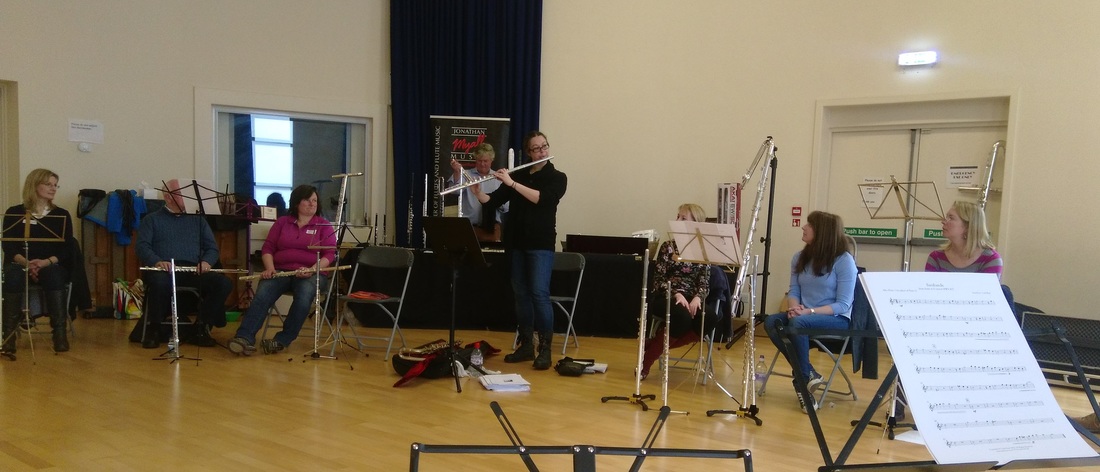 What's going on in this picture? Do some of those flutes look a bit... big? What are those giant silver drainpipes doing in the corner? This was the view at our Low Flutes Day in Sheffield a couple of weeks ago - a day of playing all those flutes that are bigger than normal! Although the alto flute was invented in the mid-19th century, and all the 'big' flutes are increasing in popularity in the flute world, they're still not particularly mainstream instruments. My first encounter with an alto was, I think, at university, where I played in a flute quartet - despite being the smallest player, I somehow ended up with the biggest flute (I loved it though)! Fast-forward to now, and at Sheffield Flute Choir we have a growing number of altos and a couple of basses between us (including mine that nobody ever wants to borrow because it's a chunky heavy old thing!). I'd become increasingly aware, though, that few of us had really got to grips with the differences between these low flutes and the normal ones - everyone's automatic reaction is to pick them up and try to play them like a 'C' flute. And then to get a bit frustrated that it's hard to get certain notes out, hard to get much volume, the tone sounds thin in places, it seems to react slowly to tonguing, and "oh my goodness my arms really ache after five minutes playing this thing". Some people didn't want to try it at all, because these giant instruments were a mystery. 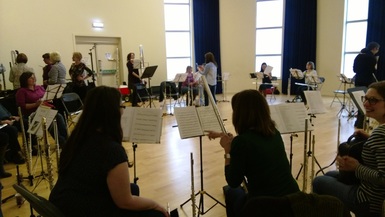 To the rescue - low flutes expert Carla Rees. I invited Carla to Sheffield to run a day de-mystifying the low flutes, helping flute players understand what was different about these flutes. To simplify a lot, the answer is... lots! A great mix of people came along, some having never played a low flute before, whilst others owned their own altos and basses. We started off playing group pieces, all sitting up nicely, trying our best to hold altos and basses up straight, trying to get a nice sound out. Very quickly we discovered that we needed to forget pretty much everything we knew (or thought we knew) about 'good' posture. Carla guided us through ways to hold the flutes, the different embouchures, air speeds... we experimented with leaning back at different angles, putting the flutes in different places on our chins. I won't go into every detail, but I will highly recommend Carla's blog for starting to learn about these techniques (or even better, her teaching in person - described by one of our participants as "a great teacher and motivator", and I couldn't agree more!). We had a fantastic Q&A session around all sorts of aspects of low flutes - including which makes of instrument to try as a beginner, and to think about progressing to if you find yourself advancing with them (I was pleased to find out that my chunky heavy beast - a Monnig alto - is not a bad place to start, and will definitely help build stamina!). We heard about Carla's training regime before her first alto recital - practice, running and weightlifting! Various players tried out bits of repertoire (including some brave sightreading on the spot) - it was lovely to see really good flute players relax into trying out techniques that sometimes felt quite alien! 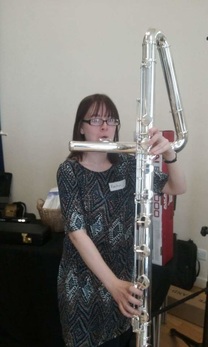 We also had the chance to try out a wonderful selection of instruments, thanks to Just Flutes who brought a stand packed with exciting things - lots of low flutes, and a few rather nice 'normal' flutes too, plus a great selection of sheet music. Huge thanks to Jonathan for bringing - and unloading, a lengthy task - a van full! This also meant that we were able to have a go on a couple of those giant drainpipe creatures - the fairly unflattering picture to the left is me playing a contrabass flute. These are BIG, heavy, and take some serious 'huffing' down, but they make an incredible sound (two octaves below the normal flute). They're also quite expensive, which is the only reason one didn't come home with me on the day - it's now a long-term savings project though. The day finished with a chance to try out all our newly-learned techniques on one of Carla's arrangements of Bach for low flutes. The sound and the feeling of 23 people all playing alto and lower was utterly incredible - the room resonated with deep harmonies. We definitely still had achy arms by the end, but we all left full of enthusiasm for low flutes and feeling equipped to make a start on learning to play them as instruments in their own right. Thank you Carla for that inspiration and the tools to go and do something about it!
Future flute days in Sheffield are in the planning - go here to find out more and sign up to the mailing list for updates! 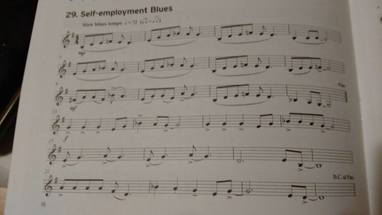 My current favourite clarinet study - don't believe the title! My current favourite clarinet study - don't believe the title! A phrase (or concept) that comes up in various forms when talking to and about adult learners is that "life gets in the way". Looking at discourses around family in the data for my MA research highlighted a recurring theme around family and work responsibilities restricting how much learners could play, practise or participate in musical activities. Almost half of the teachers I surveyed also mentioned that adult learners' other commitments had an impact on their learning - whether it was time to practise, having to cancel/ reschedule lessons, or just having the 'head space' to concentrate on learning. According to one study, the ideal teacher has “an understanding of the… responsibilities handled by adults, along with a steady insistence that students be challenged” (Roulston et al., 2015) This is definitely a challenge for teachers - judging how much to 'push' when there are other things going on in people's lives. It doesn't only apply to adult learners either. With children we're also balancing it up against other activities, school work, family circumstances, sometimes ongoing medical conditions. There's also working out how much of a priority music is for that individual person - the bigger a role it plays in their life, the more 'challenge' they're willing to take on to develop their skills. But the level of challenge can be both under- and over-estimated, and another of our jobs as teachers is to help students be realistic about that. Existing research highlights adult learners’ high levels of intrinsic motivation (Lamont, 2011, Taylor, 2011) - learning because they want to - but also finds that many struggle with 'unrealistic expectations' and subsequent frustration with their progress. We need to find ways of showing that it is possible to make progress as an adult, but it's not always going to be easy. And there isn't a set 'path' - some people spend weeks trying to get a reasonably clear sound on a flute; others quickly find a nice tone, but take longer to find the right hand position for them to balance the instrument well. Some people easily settle into a pattern of practising every day (one of my adult students works from home and has quick 'flute breaks' throughout the day), whilst others find it harder to fit another activity into their lives. (This has got me wondering about how music learners - both adults and children - manage increasing practice time and what impact that has on their progress, but I think I'll leave that for a future post). So part of the challenge is finding time, and again, how much of a priority music is has an impact on that. Now, I'm not being disparaging about those people for whom music isn't such a priority, or about different reasons for making it a priority - whether that's because they want to 'take it seriously', or because they really enjoy it, or because it's their 'me time' or their ten minutes of fun - I'm not going to judge the validity of anyone's reasons for playing music. My own journey of learning the clarinet - which has given me great insights into what it's like to be a beginner again - has brought up the issue of priorities for me too. I had set myself a challenge to do 100 sessions of clarinet practice in the last twenty weeks. It started well, I had a lovely chart where I coloured in boxes each time I practised, and for the first month or so I was on track. But then I got more students (always lovely - but slightly mystified by a sudden rush of enquiries in October!), I had some concerts to play in, I had the small matter of putting together a PhD proposal. The clarinet practice declined. And then I got a cold, and playing the clarinet with a cold is disgusting. I can cope with playing the flute with a cold, a cough, blocked ears - it's not fun but it's manageable (and I kind of have to sometimes, it's my job!). I don't have to play the clarinet though, so I didn't. I salute you reed players who manage to carry on when your head is all stuffed up. So I got out of the habit a bit. I've got back into it over the last few weeks, but there have been Christmas gigs and other festivities going on too. So I haven't done 100 practices - I can't actually tell you how many I have done as I have to admit I abandoned the chart (it was so colourful too!). The thing is, when I picked it up again, I realised I do enjoy playing the clarinet. It's a different sound, feeling and range to the flute - ahh, lovely low notes - and it's a different challenge as I'm still learning the basics and building up stamina (which I lost rather a lot of and am having to gradually get back). I'm enjoying finding out about the similarities and the differences to flute playing. But it isn't top priority - musically, the flute will always be that for me. And when life gets busy, the things that aren't top priority will drop off for a while. I don't always do as much flute practice as I'd really like - there are only so many hours in the day after teaching, admin, research, writing etc - so I have to prioritise what needs to be done, such as pieces for upcoming concerts (and sometimes that's very concentrated practice on the 'tricky bits' in short bursts). So I understand where students are coming from if I get to their lesson and they tell me they've not done much practice this week - I really do. But I will suggest ways of making practice more effective, and remind them that really, five minutes a day IS better than nothing, and five minutes a day is also better than an hour once a week. Life does get in the way, sometimes completely, and that's - well, that's life! But if you enjoy playing your instrument (even if the idea of practising is sometimes... urgh), then it's absolutely fine, in fact it's very good for you, to prioritise those bits of time doing something you enjoy. I need to remind myself of that sometimes too! -----------
Lamont, A. (2011). The beat goes on: music education, identity and lifelong learning. Music Education Research, 13(4), 369-388. Roulston, K., Jutras, P., & Kim, S.J. (2015). Adult perspectives of learning musical instruments. International Journal of Music Education, 33(3), 325-335. Taylor, A. (2011). Older amateur keyboard players learning for self-fulfilment. Psychology of Music, 39(3), 345-363. |
Keep in touch
I have an email newsletter where I share my latest blog posts, news from the flute and wider musical world, my current projects, and things I've found that I think are interesting and useful and would love to share with you. Expect lots about music and education, plus the occasional dip into research, language, freelance life, gardening and other nice things. Sign up below! Archives
July 2019
Categories
All
|
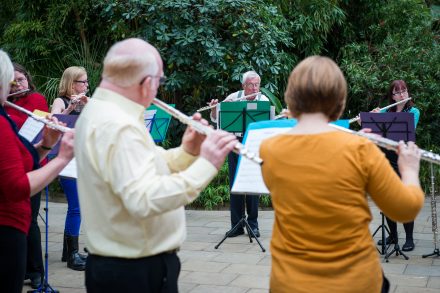
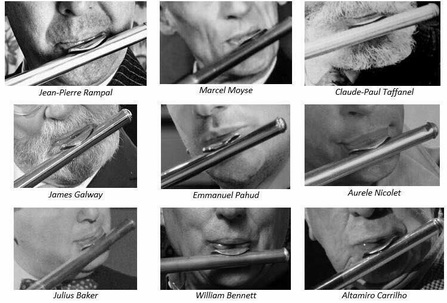

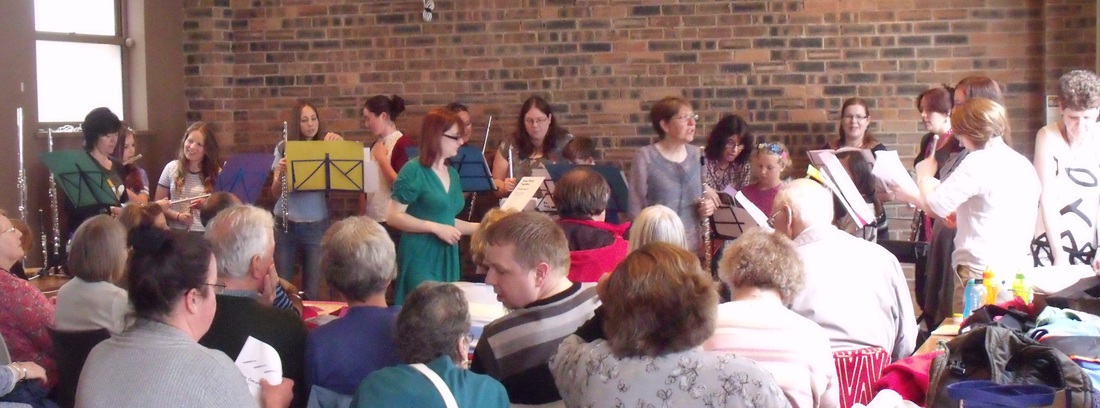
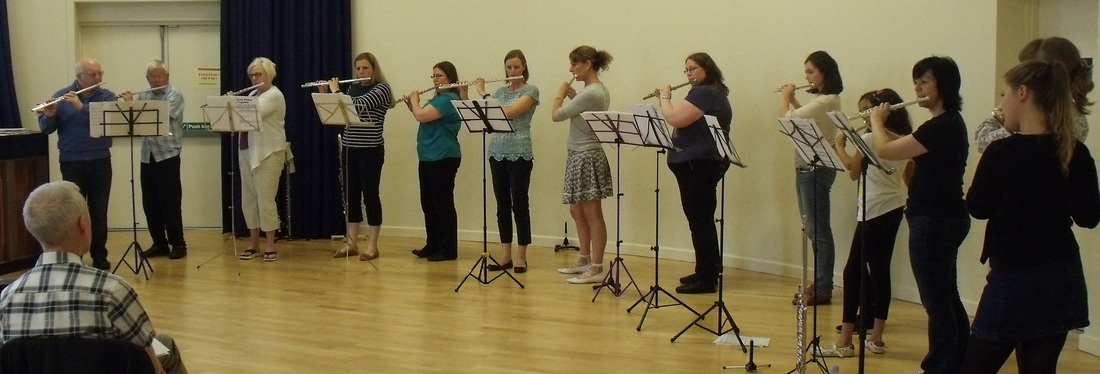
 RSS Feed
RSS Feed
